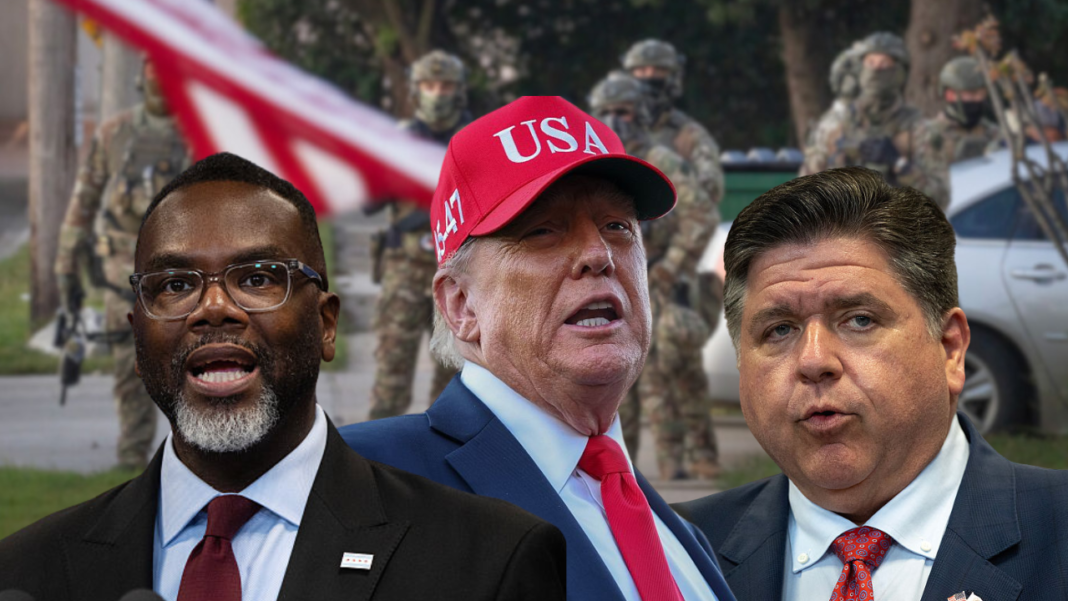Trump’s Call for Arrests: Tensions Escalate in Chicago
In a recent turn of political events, President Donald Trump has made headlines by calling for the arrest of Chicago Mayor Brandon Johnson and Illinois Governor JB Pritzker. This provocative statement comes in the context of escalating tensions surrounding federal immigration enforcement in the city. The backdrop of this situation is Trump’s ongoing efforts to deploy federal troops to Chicago, an action that many view as an intrusion into local governance amid a framework of heightened immigration raids.
Trump’s Accusations on Social Media
On Wednesday morning, Trump took to his platform, Truth Social, to express his grievances. He stated, “Chicago Mayor should be in jail for failing to protect ICE Officers! Governor Pritzker also!” However, he did not elaborate on how the mayor or governor had supposedly failed to protect ICE agents, raising questions about the basis of his accusations. This lack of clarification only fuels the growing discontent among Chicago residents and local leaders.
Immigration Raids and Local Backlash
The atmosphere in Chicago has been tense, with federal agents executing Trump’s mass immigration raids, part of a larger initiative aiming to deport up to one million undocumented immigrants by the year’s end. These operations have drawn sharp critiques from Democratic officials and residents alike, especially after incidents where both undocumented immigrants and U.S. citizens—many of whom were Black—were detained during raids. One alarming event involved federal agents using zip ties on women and children, eliciting significant outrage and fear within the community.
Chicago’s Response: “ICE Free Zone”
In direct response to these actions, Mayor Johnson signed an executive order establishing an “ICE Free Zone,” effectively prohibiting federal immigration agents from utilizing city-owned properties in their operations. This measure, a symbolic stand against federal overreach, underscores Johnson’s commitment to protecting the rights of residents against what he views as unconstitutional actions by the federal government.
Mere days after this declaration, reports surfaced of federal agents tear-gassing Chicago police officers during protests, further complicating the already fraught relationship between local and federal law enforcement. Johnson condemned these actions as “unconscionable,” highlighting a troubling dynamic where the President appears to be pitting law enforcement against one another.
A Sanctuary City’s Stance
As a sanctuary city, Chicago openly welcomes undocumented immigrants, starkly contrasting with Trump’s framing of such cities as harboring criminals. Mayor Johnson has maintained that city officials would not collaborate with federal agents in enforcing immigration laws, a position designed to safeguard the rights of the city’s vulnerable populations. This principle of local authority emphasizes a community-based approach to governance in matters concerning immigration.
Voices from the Community
Amid these upheavals, local leaders and activists are vocalizing their concerns. Stacey Davis Gates, President of the Chicago Teachers Union, articulated the broader implications of Trump’s policies, suggesting they extend beyond immigration and law enforcement. She criticized Trump for manipulating public sentiment, asserting that he creates “boogeymen” to distract from systemic issues affecting millions of Americans.
Gates pointed out that Trump’s policies disproportionately impact marginalized communities, stating, “The truth of the matter is that America has not worked for a wide swath of Americans for a very long time.” She called for collective resistance among communities suffering under these policies and emphasized the need for accountability from those in power.
The Call for Solidarity
Gates Davis further appealed for solidarity among all Americans, highlighting a shared struggle against economic inequality and social injustice. She underscored that the fight against rising authoritarianism evoked by Trump’s administration resonates across racial and economic lines. Whether Black, Hispanic, or poor white Americans, the call to action emphasizes unity in standing against policies perceived as harmful to families and communities.
Her message is clear: the fight against systemic oppression is not confined to any one group; solidarity is crucial in overcoming the challenges posed by Trump’s administration. As tensions continue to rise, the community’s response will play an essential role in shaping the narrative and direction of these ongoing political struggles.



